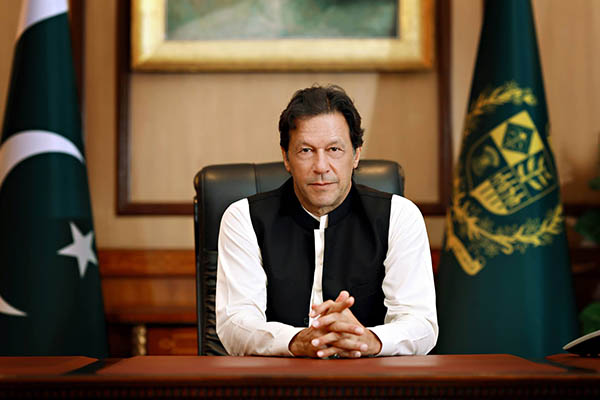
In nationally televised address, Pakistan’s prime minister tells medical professionals the country cannot afford lockdowns
Pakistan cannot afford an indefinite lockdown, and the entire nation must now learn to live with the coronavirus, Prime Minister Imran Khan said on Friday.
Addressing a nationally televised press briefing alongside relevant members of his federal cabinet, Khan said he wanted to address the criticism leveled against his government by the medical community, which has repeatedly said it is too soon to ease the lockdown restrictions imposed to curb the spread of the novel coronavirus.
“The lockdown has affected 150 million people in the country. We can impose a lockdown to contain the virus but will that stop it?” he said, adding that lifting the lockdown was imperative to allow 25 million informal laborers to earn a livelihood.
The prime minister said that if someone could say with certainty that a three-month lockdown would defeat the virus, the government would not hesitate to implement it. “But scientists say that there will be no vaccine this year. We will have to learn to live with it,” he said, adding other countries had started reporting new clusters of the virus after early successes in curbing its spread.
Assuring healthcare workers that the government realized the pressure they were under during the pandemic, he said they must understand that a country could only tackle a problem of this magnitude by taking decisions that consider repercussions on all segments of society.
Calling on healthcare workers to compare Pakistan’s economy with that of developed countries, Khan once again repeated that their economic stimulus packages had been worth hundreds of billions of dollars, while Islamabad had only allocated $8 billion.
Khan claimed the government was prepared to deal with a spike in coronavirus cases. “Although the cases are still less than the projected figure of 52,000, the numbers are likely to continue increasing,” he said. “It is estimated that four in every hundred people infected by the virus will need to be admitted to hospital. This will increase the pressure on hospitals and the government is preparing to deal with the situation.”
Relief efforts
The prime minister said the government would start disbursing cash handouts to people who had lost their jobs because of the lockdown from Monday, adding this money had been availed from the P.M.’s Corona Relief Fund.
He said the Ehsaas emergency cash program, under which Rs. 12,000 had been distributed to deserving families, was not sustainable in the long term. “How long will Rs. 12,000 fulfill their needs?” he said.
Special Assistant to the P.M. on Social Protection and Poverty Alleviation Sania Nishtar said around 8.5 million needy families had availed cash handouts under the Ehsaas program thus far. She said Rs. 104 billion had been disbursed under the program in the past five weeks.
Simple Eid
Khan also urged the nation to follow the guidelines issued by the government to prevent the spread of the virus. He said people needed to take individual responsibility and advised against celebrating the upcoming Eidul Fitr as had been done in the past.
“This Eid is different and the spread of the coronavirus can only be controlled through taking precautionary measures,” he said.
The prime minister also urged provincial governments to allow public transport services to resume to facilitate the poor. He said that some provinces had reservations over allowing public transport to operate again and the federal government was trying to reach consensus with them on the issue. “When we halt public transport, we are making life difficult for the poor. So I request everyone to reopen public transport. The U.S. and Europe have not stopped it. Why have we done it?”
Apparently, the prime minister has no issues with comparing responses to the COVID-19 pandemic with Western countries when it suits his needs—just not when they impose strict lockdowns.
Face masks
Planning Minister Asad Umar said the government had made it mandatory for people to wear masks in crowded places. This was earlier also said by Special Assistant to the P.M. on Health Dr. Zafar Mirza, who said a notification had been issued.
Umar said the country’s hospitals had the capacity to cater to projected coronavirus cases for the next six weeks, adding that this would be expanded as required during this time to ensure the health infrastructure did not get overburdened.
Meanwhile, P.M.’s focal person on coronavirus Dr. Faisal said that special care needed to be taken to ensure that other diseases such as tuberculosis, polio and common immunization, were not neglected during the fight against the coronavirus pandemic.
Stranded Pakistanis
Special Assistant to the P.M. on National Security Moeed Yusuf, meanwhile, said the government was now able to bring home 11,000-12,000 Pakistanis stranded abroad every week. He said that while the government had reduced the testing time for passengers, they would still have to spend 1-2 days in quarantine.
Economic Affairs Minister Hammad Azhar told media the provinces would decide whether or not shopping malls should be allowed to reopen. He said most provinces wanted to allow malls to reopen because they had regulated entry and systems, a controlled environment.
